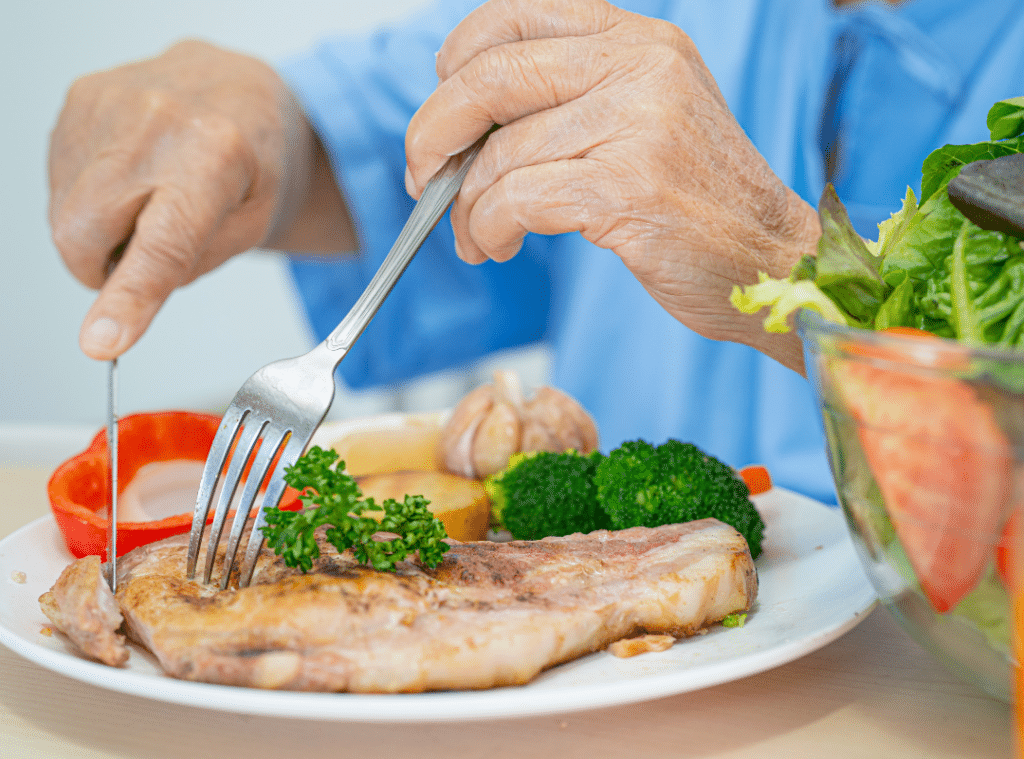Can You Eat Meat Over 65 Age? Benefits and Risks Explained
As you navigate your dietary choices after 65, whether to include meat in your meals often arises. At Westmont of Riverside, we understand that meat can provide essential protein and nutrients that support muscle health and overall well-being, but it’s not without its risks. Understanding how to safely incorporate it into your diet is vital, especially considering factors like cooking methods and the types of meat you choose. What are the specific benefits and potential pitfalls you should be aware of? The answers might surprise you and could greatly impact your health.
Can you eat meat over 65 age?
Yes, you can eat meat over 65, but it’s important to do so safely and mindfully. As you age, your protein needs may increase to support muscle health, and meat can be a valuable source of high-quality protein.
However, it’s essential to consider food safety due to the heightened risk of foodborne illnesses in older adults. To enjoy meat safely, always cook it to the recommended internal temperatures. A food thermometer guarantees that harmful bacteria are eliminated.
Avoid raw or undercooked meats, as they can pose serious health risks. Deli meats and cold cuts should also be consumed cautiously, as they can harbor listeria.
Incorporating various protein sources, including poultry, fish, and plant-based options, can enhance your diet while reducing risks. Staying informed about food safety practices and current foodborne outbreaks will help you make safer choices. Additionally, it is crucial to ensure a balanced diet that includes plenty of fruits, vegetables, and whole grains to support overall health.
Finally, remember that a balanced diet contributes to overall well-being so pair your meat consumption with plenty of fruits, vegetables, and whole grains. By being proactive about food safety, you can enjoy the benefits of meat as part of your diet.

Foods to avoid after 60
As you navigate dietary choices after age 60, you must be aware of certain foods that may pose health risks.
First on the list are undercooked meats, such as poultry and pork, which can carry harmful bacteria. Always verify these foods are cooked to safe internal temperatures to reduce the risk of foodborne illnesses.
Processed meats like deli meats and hot dogs should also be cautiously approached. They often contain preservatives and may be linked to health issues like heart disease.
Likewise, unwashed fruits and vegetables can harbor pathogens, so washing them thoroughly is essential before consumption.
Another area to be mindful of is unpasteurized dairy products. These can pose significant health risks, particularly for older adults with weakened immune systems.
It’s also wise to limit high-sodium foods, as they can contribute to hypertension and other cardiovascular issues. Additionally, good nutrition is essential for reducing chronic disease risk and promoting overall health in older adults.
What foods should the elderly avoid and why
Older adults must be aware of certain foods that can jeopardize their health. Undercooked meats, for instance, can harbor harmful bacteria that pose a considerable risk of foodborne illness. Confirm meats are cooked to safe internal temperatures to prevent any complications.
Deli meats and cold cuts may also be risky due to potential listeria contamination. It’s wise to heat these products before consumption. Additionally, fermented or dry sausages should be consumed cautiously, as they can carry pathogens that thrive in improperly stored conditions.
Unwashed fruits and vegetables can lead to infections, so always wash the produce thoroughly. Unpasteurized dairy products are another concern, as they can contain dangerous bacteria like E. coli and salmonella.
Moreover, processed foods high in sodium and unhealthy fats can exacerbate health issues like hypertension and heart disease. Opting for whole, nutrient-dense foods can considerably enhance your well-being. Including fiber-rich foods in your diet can also support digestion and overall health as you age.
Ten worst foods for seniors
Maneuvering the food landscape can be tricky for seniors, especially when identifying the worst foods for their health. Certain foods pose higher risks for older adults, and avoiding them is vital.
Raw or undercooked meats, including poultry and seafood, can harbor harmful bacteria. Similarly, deli meats and cold cuts may contain listeria, which can be dangerous for seniors.
Unwashed fruits and vegetables can also lead to foodborne illnesses; always wash produce thoroughly before consumption. Additionally, unpasteurized dairy products carry risks of pathogens that may cause serious health issues.
Sugary snacks and beverages should be limited, as they can contribute to obesity and diabetes, both of which are prevalent in older adults.
High-sodium foods like processed meals can increase blood pressure, putting you at risk for heart disease.
Finally, avoid excessive caffeine and alcohol, as they can interfere with medications and lead to dehydration. Maintaining bone health through a balanced diet can also help mitigate some of these risks.
Consider meat a sturdy bridge connecting you to essential nutrients in your golden years. While it offers strength in the form of high-quality protein, be mindful of the potential pitfalls like undercooking or overindulging in processed varieties. Just as a bridge needs maintenance, your dietary choices should be carefully managed to guarantee safety and health. Embracing variety and moderation will help you navigate the path to vitality, keeping your body strong and resilient as you age. For more information and support, contact Westmont of Riverside at 951-697-2100.
Discover the level of care you or your family member requires. What Level of Care Do You Need?
Questions on Seniors and Meat Consumption
- Is eating meat good for seniors?
Eating meat can benefit seniors when consumed in moderation and as part of a balanced diet. Meat provides essential nutrients like protein, iron, and vitamin B12, vital for maintaining muscle mass, energy, and overall health in older adults. However, seniors should choose lean cuts and limit processed meats to reduce risks associated with high saturated fat and sodium intake. - Can seniors over 65 eat meat on Fridays during Lent?
Seniors over 65 are generally not required to abstain from meat on Fridays during Lent, as the Catholic Church often exempts older adults, especially if abstinence could affect their health. However, they may still choose to observe the practice if they can and feel spiritually called to do so. - What age can you stop eating meat?
There is no specific age when someone should stop eating meat; it depends on personal health needs, dietary preferences, and medical recommendations. Some people may reduce or eliminate meat as they age to address health concerns like high cholesterol or digestive issues, while others may continue eating meat. - Which food is not recommended for senior citizens?
Foods high in saturated fat, sodium, and added sugars, like fried foods, processed snacks, and sugary drinks, are not recommended for senior citizens. Seniors should also avoid foods that pose choking hazards or are hard to digest, such as tough meats, overly fibrous vegetables, and certain raw or unpasteurized items.








